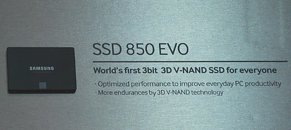- Joined
- Oct 9, 2007
- Messages
- 47,298 (7.53/day)
- Location
- Hyderabad, India
| System Name | RBMK-1000 |
|---|---|
| Processor | AMD Ryzen 7 5700G |
| Motherboard | ASUS ROG Strix B450-E Gaming |
| Cooling | DeepCool Gammax L240 V2 |
| Memory | 2x 8GB G.Skill Sniper X |
| Video Card(s) | Palit GeForce RTX 2080 SUPER GameRock |
| Storage | Western Digital Black NVMe 512GB |
| Display(s) | BenQ 1440p 60 Hz 27-inch |
| Case | Corsair Carbide 100R |
| Audio Device(s) | ASUS SupremeFX S1220A |
| Power Supply | Cooler Master MWE Gold 650W |
| Mouse | ASUS ROG Strix Impact |
| Keyboard | Gamdias Hermes E2 |
| Software | Windows 11 Pro |
Samsung and the world's second solid-state drive based on 3D vertical-NAND flash technology, the 850 EVO, was spotted on marketing material, ahead of its launch. Closely trailing the company's flagship 2.5-inch SATA 6 Gb/s drive, the 850 Pro, the 850 EVO will have lower price per GB. The drive will be based on Samsung's 3-bit (TLC) 3D V-NAND chips, and Samsung's updated triple-core processor. Given how Samsung is offering a stunning 10-year warranty with the 850 Pro, this drive could come with a similar warranty. The 850 Pro, for example, is rated with a TBW ceiling of 150 TB, double that of its predecessor.

View at TechPowerUp Main Site

View at TechPowerUp Main Site



